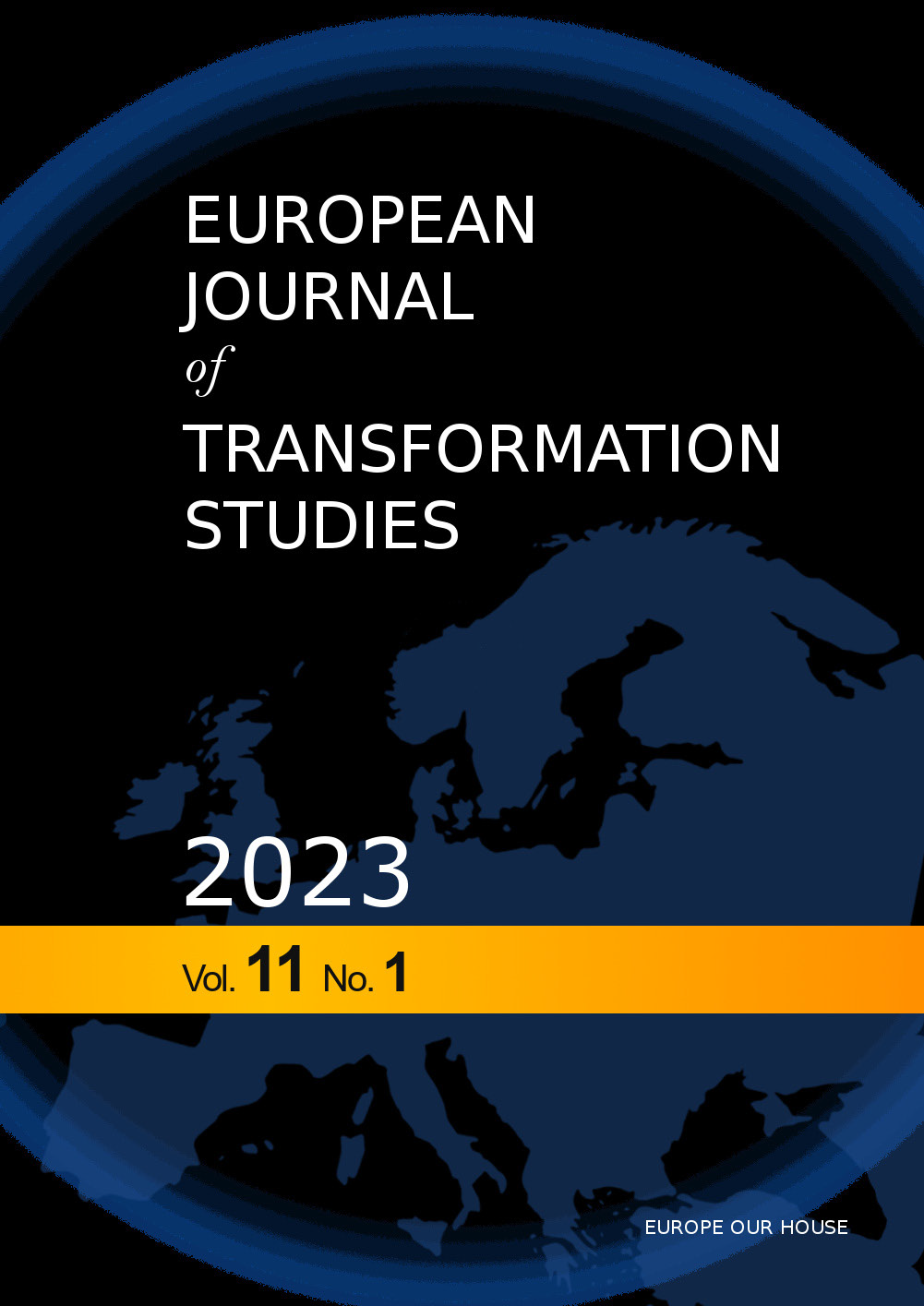Analysis of the Idiolect of Barack Obama
Słowa kluczowe:
Barack ObamaAbstrakt
In this article, the authors will focus on the analysis of the idiolect and rhetoric of U.S. President Barack Obama through his speeches, statements, and use of terms. As the main research method, we will use the analysis and for better description and result evaluation, we also focus on comparison with other U.S. presidents. For a deeper analysis of the discursive strategies of Barack Obama, we also apply critical discourse analysis to achieve more complex characteristics of his idiolect. Following this main goal by writing the article we suppose that the rhetoric and idiolect of Barack Obama is positively disposed and very attractive for the public.
Downloads
Bibliografia
Afra, O., (2012), Analysis of Obama's rhetorical style [online]. :http://www.jewishjournal. com/zoangel /item /analysis_of_obamas_rhetorical_style_20120305>.
Alim, H.S. – Smithermann, G., (2012), Articulate while Black: Barack Obama, language, and the race in the U.S. New York: Oxford University Press, 205. ISBN 978-0-19-981296-7.
Atwater, D.F., (2009), Senator Barack Obama; The Rhetoric of Hope and the American Dream. In: Journal of Black Studies [online].
Berry, M.F. – Gottheimer, J., (2011), Power in Words: The Stories behind Barack Obama’s Speeches, from the State House to the White House. Boston: Beacon Press, 304. ISBN 978- 0-8070-0169-1.
Bettiza, G., (2009), Obama's Middle East Policy: Time to Decide. In: LSE IDEAS Reports: Obama’s Nation? US Foreign Policy One Year On [online].
Brhlikova, R., (2013), Uplatńovanie soft power Európskej inie voci azijsko-pacifickému regiónu. In: Civitas: Casopis pre politické а socialne vedy, Vol. 19, n. 45 (2013), 2-6. ISSN 1335-2652.
Clark, R.P., (2008), Why It Worked: A Rhetorical Analysis of Obama's Speech on Race [online]. http:/ /www.poynter.org/how-tos /newsgathering-storytelling/writing-tools /88009 /why-itworked-a-rhetorical-analysis-of-obamas-speech-on-race/ >.
Coleman, I., (2013), Obama's address: Where's foreign policy? [online]. http:/ /www.edition. cnn.com/2013/02/13/opinion/coleman-sotu>.
Dobrowolski, T., (2008), Hodnotovy systém prezidentského kandidata USA. In Politické vedy. [online]. Roć. 11, č. 3-4. ISSN 1338 – 5623, p. 172-184. [cit. 2015-02-05]. < http://www. fpvmv.umb.sk/userfiles/file/3_4_2008/DOBROWOLSKI.pdf>.
Ellis, R.J., (2012), The Development of the American Presidency. New York: Routledge, 2012. 585 p. ISBN 978-0-4158-7884-5.
Ferrara, M.S., (2013), Barack Obama and the Rhetoric of Hope. North Carolina: McFarland, 204. ISBN 978-0786467938.
Gerges, F., (2012), Obama and the Middle East: The End of America's Moment?. New York: Palgrave Macmillan, 304. ISBN 978-0-230-11381-7.
Hart, R.P., (2014), Communication and Language Analysis in the Public Sphere. Hershey: IGI Global, 580. ISBN 978-1466650039.
Horvath, J., (2009), Critical Discourse Analysis оё Obama’s Political Discourse. In: Language, Literature and Culture in a Changing Transatlantic World. International Conference Proceedings. Presov: Filozoficka fakulta Presovskej univerzity. ISBN 978-80-555-0025-6. p. 45-56.
King, E.G., (2014), Obama, the Media, and Framing the U.S. Exit from Iraq and Afghanistan. Farnham: Ashgate Publishing, 234. ISBN 978-1-4094-2964-7.
Kocnerova, M. – Kasanova, Р., (2013), Analysis оё е Idiolect of U.S. Presidents. The Language of George W. Bush and comparison with his successor, Barack Obama. In: The Annual of Language & Politics and Politics of Identity. Praha: Charles University, Vol. VII, 61-76. ISBN 978-80-87404-48-5.
Laclau, E. – Mouffe, C., (2001), Hegemony and Socialist Strategy: Towards a Radical Democratic Politics. London: Verso, 200. ISBN -13:978-1781681541.
Lakoff, G., (2013), Obama’s speeches are not just words – they are political action. [online].
Mészárosová, Z., (2006), Lazarsfeld dvoch svetadielov, In: Anthropos, Časopis pre humanitné a sociálne poznanie, Vol. 3, N. 1, 53-55. ISSN 1336-554.1
Mieder, W., (2009), „Yes We Can”: Barack Obama’s Proverbial Rhetoric. New York: Peter Lang Publishing Inc, 352. ISBN 978-1433106675.
Nau, H.R., (2013), Obama´s foreign policy and the loyal opposition [online]. . Nye, J.S., (2011), The Future of Soft Power. New York: Public Affairs, 320. ISBN-13: 9781586488925
Obama, B., (2009a), Interview with Al Arabiya [online]. Obama, B., (2002), Obama’s Speech Against The Iraq War [online].
Obama, B., (2010), Remarks by the President on Strengthening Intelligence and Aviation Security. [online].
Obama, B., (2009b), Speech at Cairo University [online].
Obama, B., (2008), Speech on Race. [online]. http://www.nytimes.com/2008/03/18/us/ politics/18text-obama.html?pagewanted=all&_r=0>.
Pan, C. – Isakhan, B. – Nwokora, Z., (2020), Othering as soft-power discursive practice: China Daily’s construction of Trump’s America in the 2016 presidential election [online]. Politics 2020, Vol. 40(I). p. 54-69. DOI: 10.1177/02633957. Available online: journals.sagepub.com.
Rezaei, S. – Nourali, N., (2016), Language and Power: The Use of Persuasive Techniques in Iran and U.S. President Speeches [online]. Journal of Language Teaching and Research, Vol. 7, No. 6, p. 1203-1209. http://www.academypublication.com/issues2/jltr/vol07/06/ jltr0706.pdf>. ISSN 1798-4769.
Solo, A.M.G., (2014), Political Campaigning in the Information Age. Hershey: IGI Global, 2014. 359 p. ISBN 978-1466660625.
Sorensen, T., (2011), Foreword. In Power in Words: The Stories behind Barack Obama´s Speeches, from the State House to the White House. Boston: Beacon Press, 2011. ISBN 978- 0-8070-0169-1. 1-2.
Tökölyová, T., (2016), Nation–branding in small–states foreign politics[online], Journal of Geography, Politics and Society 6 (4), 7-14.
Walter, A. et al., (2011), ‘Hope’ and ‘Change’ Meet Reality: President Obama’s Reelection Roadmap. [online].

 Uniwersyteckie Czasopisma Naukowe
Uniwersyteckie Czasopisma Naukowe



